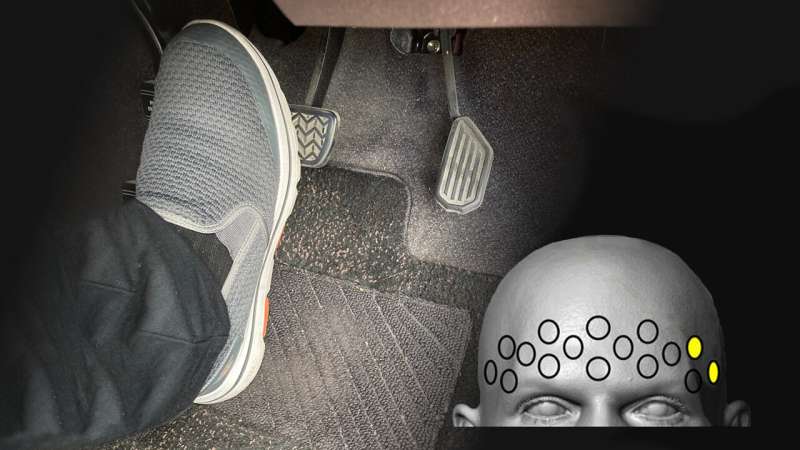Brain patterns reveal why elderly drivers are prone to mistaking the gas pedal for the brake pedal

Scanning the brains of elderly people and college students while performing braking and acceleration simulations, researchers in Japan have found that older participants have longer reaction times, slower decision times, and greater brain activation in the parts of the brain involved with inhibition and switching tasks. These findings suggest insights into the causes of accidents involving elderly drivers who mistake the brake for the accelerator.
As reported in the media, accidents have increased in which older drivers mistakenly step on the accelerator instead of the brake. Concerned that cognitive decline may be a leading cause of such incidents, the National Police Agency of Japan, a country with one of the oldest populations in the world, requires adults over 75 years of age to take periodic cognitive tests. However, few studies have investigated executive functions and brain activity among older adults in terms of foot responses during braking and accelerating.
To address this gap, a group led by Professor Nobuyuki Kawai of the Graduate School of Informatics at Nagoya University in Japan scanned the brains of elderly people and students while performing pedal-pressing simulations. The researchers were particularly interested in the left dorsolateral prefrontal cortex, the part of the brain associated with inhibition and switching responses.
To simulate the response of a person's feet and hands when driving a car, they created a new task in the laboratory called the bimanual and bipedal response selection and response-position compatibility task. During this task, a signal directed participants to press the left or right button with their left or right foot, or their left or right hand.
Sometimes participants pressed the pedal in front of them, whereas at other times they had to press it diagonally. This was done to allow the researchers to assess how the participants responded in situations where the cognitive load was higher. Administering this task to both university students and elderly participants, the researchers then monitored blood flow in their brains. The results were published in Behavioural Brain Research.
They found that older participants had longer reaction times, slower decision times, and greater brain activation than younger people. Furthermore, pressing the diagonal pedal required longer reaction times and greater brain activation than pressing directly ahead in the left dorsolateral prefrontal cortex. Interestingly, this was only found when people were asked to use their feet but not their hands. In short, older people had to do more active thinking than younger people when deciding which 'pedal' to press with their feet.
"This indicates that the cognitive load is higher when pushing the pedal diagonally with the foot, such as when pressing the brake," explains Professor Kawai.
"When you push a diagonal pedal with your foot, you are using the frontal lobe more than when you push the pedal straight in front. In particular, the left dorsolateral frontal lobe, which is important for response switching, is more active when the foot is pressed at an angle than when the pedal is pressed straight. In these tasks, older adults have higher neural activity throughout the frontal lobe than college students."
This study's findings suggest that to compensate for the decline in cognitive functions, greater brain activation may be necessary in elderly people. Older people may struggle in situations with a high cognitive load, such as parking a vehicle in a narrow space. "This study suggests that the performance of older adults is vulnerable in these situations," Professor Kawai explains.
"Elderly drivers should not be overconfident that their driving is fine. Even elderly people who are normally able to drive without any problems, when a cognitive load is applied, such as when switching from one parking space to another or when talking to a passenger, things may be different and there is a chance of pressing the wrong pedal. We believe that it is important to educate elderly drivers about this fact."
More information: Nobuyuki Kawai et al, Do older adults mistake the accelerator for the brake pedal?: Older adults employ greater prefrontal cortical activity during a bipedal/bimanual response-position selection task, Behavioural Brain Research (2022). DOI: 10.1016/j.bbr.2022.113976















